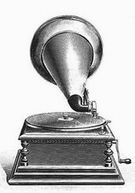| Communities > Ford > Sound | About Contact |

Ford - Sound
Oral History Recording of Fred Weatherstone (28th June 1978)

Transcription of an interview with Fred Weatherstone recorded on the 28th June 1978.
Mr. Weatherstone was born at Newcastle upon Tyne in 1897. He moved to Ford village in 1899 when his father took over the blacksmiths shop in the village. During the full interview Mr. Weatherstone talks generally about his work as a blacksmith and his upbringing in Ford. Occasionally Mr. Weatherstone's sister offers comment during the recording.
During this extract Mr. Weatherstone recalls his early employment working for his father in the Ford village blacksmiths shop.
[Transcription]
The first thing I can remember doing very much was helping pull off shoes off the horses, I didn't put the shoes on then, I had to pull them off and start and dress the feet, and we used to make an awful lot of bolts, bolts to go into hinges for gates and what not, I did alot of that. And I drilled a lot of holes in what I called the old treadmill, it was a machine that went with the foot you know. And it was a pretty monotonous job and a hard job. Its still in the blacksmith shop here.
When you say that you were pulling the shoes off and dressing the horses feet, how did you dress the foot in those days?
Well you had a knife, a paler knife of course which was sought of shaped, then you cut round the boot you know, but you also had a knife, just a steel knife we made them out of an old file and you used a hammer and you chipped around the boot, and then you had your rasp and you rasped it off, filed it off.
Did you did hot shoeing all the time?
Oh yes.
You never did any cold shoeing?
No, it was all hot shoeing in my time.
This tape recording comes from the large collection of oral history recordings held by the Northumberland Archive Service. Interviews were conducted by Record Office staff from the early 1970's right through until the mid 1980's. The purpose of the recordings was to capture the essence of life in the late 19th and early 20th centuries. Many different subjects were covered, including coalmining, farming, fishing, domestic life, World Wars and entertainment. Over 350 recordings have been collected comprising approximately 700 hours of recollections.